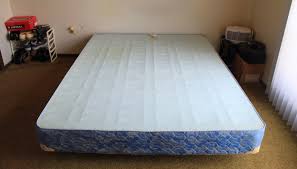If you haven’t read the Part 1 of our Pros and Cons of Memory Foam Mattresses, please do so, before you read this page. We don’t want to scare you away from memory foam by making you read the relative disadvantages of memory foam.
Despite the rave reviews and countless positive testimonials concerning the benefits and the value that memory foam mattresses add to the lives of many consumers globally, it goes without saying that memory foam mattresses are not necessarily fit for everyone. There may be some exclusions or demerits of memory foam mattresses which make them unsuitable for various people and these such cons of memory foam are discussed here…

(Image Credits: Wikipedia.org)
The Disadvantages Of Memory Foam Mattresses
Like every other good thing, there’s always two sides of the coin, and here are the key complaints associated with memory foam mattresses as expressed by current and long-term users.
-
Heavy Weight

(Image Credits: Wikipedia.org)
Due to the thick density of the memory foam, a memory foam mattress is not a sleeping bag you can easily carry around, and many have trouble turning it over or moving it about for this same reason. Be it a heavy duty or low density memory foam mattress, the overall weight and bulkiness of the mattress is bound to get in the way of its easy mobility and lifting.
Nonetheless, this disadvantage also has a good implication: that the memory foam mattress does not move about easily on the bed while you lie on it, and even when you toss about and turn in your sleep.
-
Initial Odor
As is typical with most new things, there comes with it an associated smell of newness which in the case of the memory foam mattress may be deemed as a kind of off-putting effusion or gassing. This distinct but not unbearable odor is connected to the polyurethane itself which is what makes up the memory foam mattress core content. It is more obvious once the mattress packaging is opened but thankfully diffuses with time and should have greatly diminished within 2 weeks’ time.
More specifically, this is due to breaking up of volatile organic compounds aka VOCs. They aren’t toxic, however, can be a little unpleasant the first few days of opening the package.
While it may initially cause discomfort or alter your experience lying on the new memory foam mattress, it is not something that will cost your sleep. It’s not a toxic odor neither would it be deemed a health hazard for it is just a chemical smell. There are certain steps you can take to mediate the initial memory foam gassing, and these include the use of scented bedding and mattress covers.
-
Heating Up

(Image Credits: Youtube.com)
The memory foam mattress may tend to get hot, and if you’re a sweating sleeper this may get slightly unbearable. This heating up worsens with the memory foam density, whereby higher density memory foam mattresses tend to heat up more in addition to a more viscous contortion to your body which further accelerates body temperatures. This may be a good thing in winter, but hot summer nights could get uncomfortably sweltering.
Perhaps a good workaround is layering your memory foam mattress with fine cotton sheets as opposed to synthetic fiber sheets or non-porous sheets which would only complicate your sleeping temperatures.
Yet another solution to hot memory foam is through addition of a top gel layer which further aids the cooling in a superior mechanism that keeps both you and the mattress cool as a cucumber. Of course this comes at an extra cost, and you could get it as an accessory or as a 2-in-1. Our #1 Bedroom Solutions recommended memory foam mattress, the Perfect Could UltraPlush comes with 3″ of cool gel memory foam to keep you cool all night long. In the modern marketplace, there are plenty of such gel memory foam mattresses that will do the trick for you!
Here’s a video review of one of our most recommended memory foam mattresses. Enjoy!
